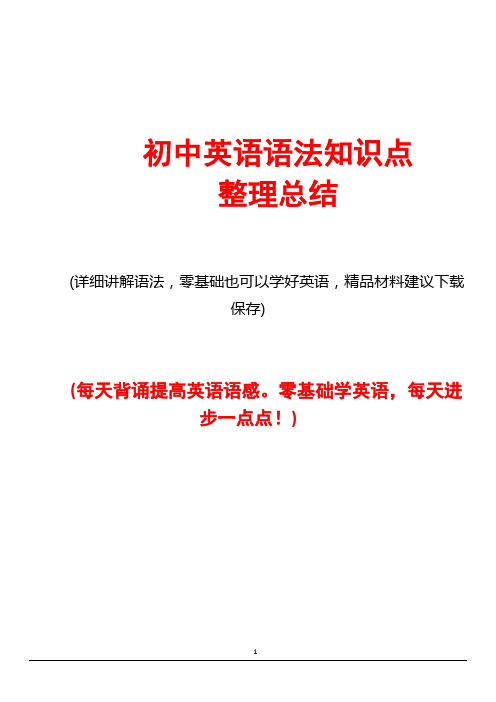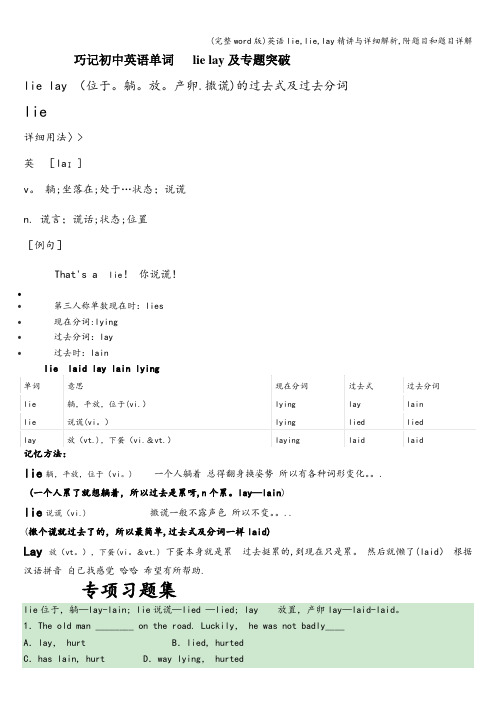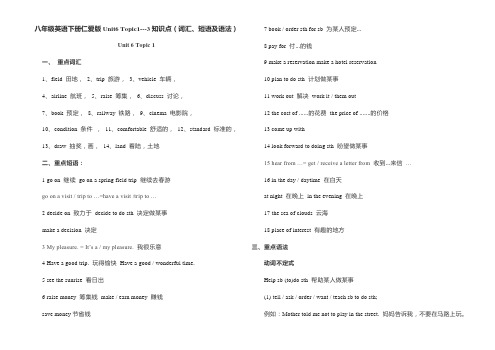初中英语--连系动词word版本
- 格式:pdf
- 大小:75.21 KB
- 文档页数:6

初中英语语法知识点整理总结(详细讲解语法,零基础也可以学好英语,精品材料建议下载保存)(每天背诵提高英语语感。
零基础学英语,每天进步一点点!)一、词类、句子成分和构词法:一).词类:英语词类分十种:二).句子成分:英语句子成分分七种:主语、谓语、宾语、定语、状语、表语、宾语补足语。
1、主语:句子的主体,全句述说的对象。
回答是“谁”或者“什么”。
一般由名词、代词、不定式、动名词或从句担当,位于句首。
The boy needs a pen.Smoking is bad for you = To smoke is bad for you2、谓语:说明主语的动作或状态。
回答“做(什么)”。
由动词或系动词加表语担任,常置于主语后。
如:The train leaves at 6 o’clock.She is reading.3、宾语:表示动作的对象。
回答做的是“什么”。
一般由名词或代词担当,常置于谓语后。
如:He won the game.He likes playing computer.注意:1)有些及物动词带有两个宾语,一个指物(直接宾语),一个指人(间接宾语)。
间接宾语一般放在直接宾语前面。
如:He wrote me a letter . (他给我写了一封信)2)有时可把介词to或for加在间接宾语前构成短语,放在直接宾语后面,来强调间接宾语。
如:He wrote a letter to me . (他给我写了一封信)4、表语:用以表述主语的特征、状态、身份等。
回答是“什么”或者“怎么样”。
一般由名词或形容词担任,置于系动词或be动词之后。
如:He is a student. We are tired.注意:除了be 系动词外,还有一些动词也可以用作系动词,1)表感官的动词: feel, smell, taste, sound, look, appear, seem 等。
2)表转变变化的动词: become, get, grow, turn, go等。

Unit11. by + doing 通过……方式如:by studying with a groupby 还可以表示:, ,"在…期间"、"乘车"等如:I live by the river. "在…旁"I have to go back by ten o'clock. "靠近"The thief entered the room by the window. "经过"The student went to park by bus. "用,",2. talk about 谈论,议论,讨论如:The students often talk about movie after class. 学生们常常在课后讨论电影。
talk to sb. === talk with sb. 与某人说话3.提建议的句子:①What/ how about +doing sth.? 如:What/ How about going shopping?②Why don't you + do sth.? 如:Why don't you go shopping?③Why not + do sth. ? 如:Why not go shopping?④Let's + do sth. 如:Let's go shopping⑤Shall we/ I + do sth.? 如:Shall we/ I go shopping?4. a lot 许多常用于句末如:I eat a lot. 我吃了许多。
5.too…to 太…而不能常用的句型too+adj./adv. + to do sth.如:I'm too tired to say anything. 我太累了,什么都不想说。

巧记初中英语单词lie lay及专题突破lie lay (位于。
躺。
放。
产卵.撒谎)的过去式及过去分词lie详细用法〉>英[laɪ]v。
躺;坐落在;处于…状态;说谎n. 谎言;谎话;状态;位置[例句]That's a lie!你说谎!lie躺,平放,位于(vi。
) 一个人躺着总得翻身换姿势所以有各种词形变化。
.(一个人累了就想躺着,所以过去是累呀,n个累。
lay—lain)lie说谎(vi.) 撒谎一般不露声色所以不变。
..(撒个谎就过去了的,所以最简单,过去式及分词一样laid)Lay 放(vt。
),下蛋(vi。
&vt.) 下蛋本身就是累过去挺累的,到现在只是累。
然后就懒了(laid)根据汉语拼音自己找感觉哈哈希望有所帮助.专项习题集lie位于,躺—lay-lain; lie说谎—lied —lied; lay 放置,产卵lay—laid-laid。
1.The old man ________ on the road. Luckily, he was not badly____A.lay, hurt B.lied, hurtedC.has lain, hurt D.way lying, hurted参考答案: A2。
The little girl who ________on the bed ________to her mother that the old hen had ________two eggs。
A。
lay; lay; lied B. lied; lied; liedid; laid; laid D。
lay; lied; laid参考答案:D3。
He asked me to _______ the table while he himself _______ in bed。
A。
lay; lied B。
lay; lay C. lied; laid D. lay; laid参考答案:B4. He found the egg ________ that morning ________ on the floor. 无答案A。

初中英语语法知识梳理——动词一、连系动词:连系动词本身有一定的词义,但不统统,不能独立作谓语,必须与表语一起构成合成谓语。
(一)状态类:表示具有或保持某种特征或状态。
多见的有:be(是),keep(保持),stay(保持),remain(保持,依然),seem(似乎是),appear(似乎,显得)如:The man seems surprised about the question I asked.*keep, stay, remain的区别:1、keep“保持……状态”,后接adj.或介词短语,其后多见:alive,awake,silent,fit,fine,close,clean,happy等。
如:In order to keep fit, all students play sports.Keep in touch with sb.“和……保持联系”2、remain“仍然存在……状态”,后接adj.、过去分词、名词或介词短语,强调某种状态前后无变化。
如:The door remained closed.3、stay“保持……状态”,后接形容词、介词。
如:The door stayed closed.(无比较的的持续状态)(二)感官类:主要指与感官有关的词:look(看起来),sound(听起来),smell(闻起来),taste(尝起来),feel(摸起来,感到)如:The story sounds true.(三)变化类:多见的有turn(变成),grow(变得),get(变成),become(变成,成为),fall(进入某种状态)1、become和get主要指一个人暂时性的身心变化或永久性的自然变化,另外它们还可用于指天气的变化和社会的趋势。
如:它们后常接angry, famous,ill, old, well, deaf, strong等。
如:get dressed穿衣服2、grow“渐渐变得……起来,长得”,主要表示逐渐变化,强调变化的过程。

八年级英语下册仁爱版Unit6 Topic1---3知识点(词汇、短语及语法)Unit 6 Topic 1一、重点词汇1、field 田地,2、trip 旅游,3、vehicle 车辆,4、airline 航班,5、raise 筹集,6、discuss 讨论,7、book 预定,8、railway 铁路,9、cinema 电影院,10、condition 条件,11、comfortable 舒适的,12、standard 标准的,13、draw 抽奖,画,14、land 着陆,土地二、重点短语:1 go on 继续go on a spring field trip 继续去春游go on a visit / trip to …=have a visit /trip to …2 decide on 致力于decide to do sth 决定做某事make a decision 决定3 My pleasure. = It’s a / my pleasure. 我很乐意4 Have a good trip. 玩得愉快Have a good / wonderful time.5 see the sunrise 看日出6 raise money 筹集钱make / earn money 赚钱save money节省钱7 book / order sth for sb 为某人预定...8 pay for 付...的钱9 make a reservation make a hotel reservation10 plan to do sth 计划做某事11 work out 解决work it / them out12 the cost of ......的花费the price of .......的价格13 come up with14 look forward to doing sth 盼望做某事15 hear from …= get / receive a letter from 收到...来信…16 in the day / daytime 在白天at night 在晚上in the evening 在晚上17 the sea of clouds 云海18 place of interest 有趣的地方三、重点语法动词不定式Help sb (to)do sth 帮助某人做某事(1) tell / ask / order / want / teach sb to do sth;例如:Mother told me not to play in the street. 妈妈告诉我,不要在马路上玩。

连系动词知识点详解(初中英语专题复习)一:引入1.The sky looked grey.天空看起来灰蒙蒙的。
这个句子中主语是“天空(the sky)",天空怎么样?天空看起来灰蒙蒙的(grey)。
grey补充说明了the sky的状态。
look连接the sky和grey。
2.Joey is a comedian. Joey是个喜剧家。
这个句子中主语是Joey,Joey怎么样?Joey是个喜剧家(a comedian)。
comedian补充说明了Joey的情况。
is连接Joey和a comdian。
再看两个例子。
3.The linguini tastes delicious.意大利面吃起来美味。
这个句子中主语是“意大利面(the linguini)",意大利面怎么样?意大利面吃起来美味(delicious)。
delicious补充说明了the linguini怎么样。
tastes连接the linguini和delicious。
4.Paul became a physician. Paul 成为了物理学家。
这个句子中主语是Paul,Paul怎么样?Paul 成为了物理学家(a physician)。
physician补充说明了Paul 的情况。
became连接Paul 和a physician。
从上面的4个句子中大家发现了什么?looks, is, tastes, became在句子中作什么成分?它们连接了句子中的主语(the sky, Joey, the linguini和Paul)和后面的形容词(grey, delicious)或者名词(a comedian, a physician)。
那么它们是什么样的动词呢?我们来看。
它们都是系动词。
系动词是连接句子中的主语和形容词或名词的动词。
是用来辅助主语的动词,它本身有词义,但不能单独用作谓语,其后必须跟表语,构成系表结构说明主语的状况、性质、特征等情况。
初中英语语法大全之连系动词连系动词:①连系动词用来连接主语和表语,连系动词后面常为形容词。
②常见的连系动词有:be、become、look、feel、sound、smell、taste、seem、turn、grow、get、go、fall、sit、stand、lie 等。
③有些连系动词来源于实义动词,意思也跟着变化:look(看看起来)、feel(感觉、摸感到)、smell(闻、嗅闻起来)、taste(尝尝起来)、turn(翻转、转动变得)、grow(生长变得)、get(得到、到达变得)、go(去变得),所不同的是,作为实义动词时,后面不能跟形容词。
[注释]become、get、go、be、grow、turn的用法区别:become表示变成,比较正式,通常不用将来时表示动作已经完成。
get也表示动作已经完成,但是更加口语化,通常表示温度、时间、岁数等变化。
go表示变得,常见于某些短语中,后面常有形容词bad、blind、hungry等。
be表示是、成为、当,多用于将来时、祈使句或不定式中。
grow表示变得,常指逐渐的变化,表示身高、岁数的增长。
turn表示变得,指变为与原先不同的情况,通常指颜色等变化。
如:I was caught in the rain and I became ill.(我淋雨感冒了)/ He has got rich.(他变富了)/ He will be a scientist in the future.(将来他将成为科学家)/ My little brother has grown much taller in the past year.(在过去的一年里我的弟弟长得高多了)/ The sandwich has gone bad.(那块三明治已经变坏)/ Her face turned red after her mother criticized(批评) her.(妈妈批评了他以后他的脸变红了)希望上面对连系动词知识的讲解学习,能很好的帮助同学们对此知识的巩固学习,相信同学们一定会考出优异成绩的。
连系动词的用法讲解及练习题一"be":is am are四"变":get become turn go五"感官":feel taste smell sound look系动词系动词亦称联系动词(Link Verb),作为系动词,它本身有词义,但不能单独用作谓语,后边必须跟表语(亦称补语),构成系表结构说明主语的状况、性质、特征等情况。
说明:有些系动词又是实义动词,该动词表达实义时,有词义,可单独作谓语,例如:He fell ill yesterday.他昨天病了。
(fell是系动词,后跟补足语,说明主语情况。
)He fell off the ladder.他从梯子上摔下来。
fell是实义动词,单独作谓语。
1)状态系动词用来表示主语状态,只有be一词,例如:He is a teacher. 他是一名教师。
(is与补足语一起说明主语的身份。
)2)持续系动词用来表示主语继续或保持一种状况或态度,主要有keep, rest, remain, stay, lie, stand, 例如:He always kept silent at meeting. 他开会时总保持沉默。
This matter rests a mystery. 此事仍是一个谜。
3)表像系动词用来表示"看起来像"这一概念,主要有seem, appear, look, 例如:He looks tired. 他看起来很累。
He seems (to be) very sad. 他看起来很伤心。
4)感官系动词感官系动词主要有feel, smell, sound, taste, 例如:This kind of cloth feels very soft.这种布手感很软。
This flower smells very sweet.这朵花闻起来很香。
5)变化系动词这些系动词表示主语变成什么样,变化系动词主要有become, grow, turn, fall, get, go, come, run.例如:He became mad after that. 自那之后,他疯了。
13.[甘肃白银] — Excuse me,is this the right way to the Children's Palace?— Sorry,I'm not sure.But it _____ be.A.mustn'tB.mightC.can'tD.must14.[四川内江] — Look,the lady in red _____ be our English teacher.— No,she _____ be.She is in the office now.A.must;can'tB.can;mustn'tC.may;mustn'tD.shall;can't15.[重庆考题] — Must we finish the work today?— _____.We have something else to do tomorrow.A.Yes,we canB.No,we can't.C.Yes,we must.D.No,we needn't【答案速递】1.C2.C3.D4.A5.D6.A7.D8.B9.B 10.C 11.B 12.C 13.B 14.A 15.C第十一章连系动词连系动词又称系动词,是表示主语身份、性质、状态的动词。
连系动词在句子中不能单独作谓语,总是与后面作表语的名词、形容词、代词或分词一起构成系表结构,集体充当句子的谓语。
连系动词只有主动式,没有被动式。
如:His father is an English teacher.他父亲是个英语老师。
The cakes my mother cooked taste delicious.我妈妈做的蛋糕很好吃。
11-1 连系动词的5种类型连系动词根据其性质可分为状态系动词、持续系动词、表象系动词、感官系动词和变化系动词五种类型。
1.状态系动词表示人或事物状态的系动词称为状态系动词。
连系动词的用法讲解及练习题一"be":is am are四"变":get become turn go五"感官":feel taste smell sound look系动词系动词亦称联系动词(Link Verb),作为系动词,它本身有词义,但不能单独用作谓语,后边必须跟表语(亦称补语),构成系表结构说明主语的状况、性质、特征等情况。
说明:有些系动词又是实义动词,该动词表达实义时,有词义,可单独作谓语,例如:He fell ill yesterday.他昨天病了。
(fell是系动词,后跟补足语,说明主语情况。
)He fell off the ladder.他从梯子上摔下来。
fell是实义动词,单独作谓语。
1)状态系动词用来表示主语状态,只有be一词,例如:He is a teacher. 他是一名教师。
(is与补足语一起说明主语的身份。
)2)持续系动词用来表示主语继续或保持一种状况或态度,主要有keep, rest, remain, stay, lie, stand, 例如:He always kept silent at meeting. 他开会时总保持沉默。
This matter rests a mystery. 此事仍是一个谜。
3)表像系动词用来表示"看起来像"这一概念,主要有seem, appear, look, 例如:He looks tired. 他看起来很累。
He seems (to be) very sad. 他看起来很伤心。
4)感官系动词感官系动词主要有feel, smell, sound, taste, 例如:This kind of cloth feels very soft.这种布手感很软。
This flower smells very sweet.这朵花闻起来很香。
5)变化系动词这些系动词表示主语变成什么样,变化系动词主要有become, grow, turn, fall, get, go, come, run.例如:He became mad after that. 自那之后,他疯了。
She grew rich within a short time. 她没多长时间就富了。
6)终止系动词表示主语已终止动作,主要有prove, turn out, 表达"证实","变成"之意,例如:The rumor proved false. 这谣言证实有假。
The search proved difficult. 搜查证实很难。
His plan turned out a success. 他的计划终于成功了。
(turn out表终止性结果).系动词与动词的区别系动词亦称联系动词(Link Verb),作为系动词,它本身有词义,但不能单独用作谓语,后边必须跟表语(亦称补语),构成系表结构说明主语的状况、性质、特征等情况。
但是,有些系动词又是实义动词,该动词表达实义时,有词义,可单独作谓语。
例如:He felt ill yesterday.他昨天病了。
(felt是系动词,后跟补足语,说明主语情况。
)He fell off the bike.他从自行车上摔下来。
fell是实义动词,单独作谓语。
表示动作中状态的词叫做动词。
根据其在句中的功能,动词可分为四类,分别是:实义动词、系动词、助动词、情态动词。
但是,有些情况下,有些动词是兼类词。
例如:We are having a meeting.我们正在开会。
(have是实义动词。
)He has gone to New York.他已去纽约。
(have 是助动词。
)动词根据其后是否带有宾语,可分为两类,分别是:及物动词、不及物动词,英语缩写形式分别为vt. 和vi.。
但是,同一动词有时可用作及物动词,有时可用作不及物动词。
例如:She can dance and sing. 她能唱歌又能跳舞。
(sing在此用作不及物动词。
)She can sing many English songs. 她能唱好多首英文歌曲。
(sing用作及物动词。
)比较法比较下列各组句子(1) A.Please look at the blackboard.请看黑板。
B.He looked a perfect fool.他看上去是个十足的神经病(2) A.Turn to Page 16.翻到16页。
B.He turned traitor to his country.他背叛了祖国。
(3)A.He felt it his duty to help others.他认为帮助别人是自己的责任。
B.I felt very hungry after a long walk.走了一段长路,我感到很饿。
(4)A.Get me some ink.给我一些墨水。
B.Our motherland is getting stronger and stronger.我们国家变得越来越强大了。
(5)A.Such words do not become a scholar.那样的话不像出自学者之口。
B.Some of the fields became covered with water.一些田地覆盖着水。
(6)A.This black key on the piano won''t sound.这钢琴上的黑键按下去不响。
B.The story sounds interesting.这故事听起来很有趣。
(7)A.I am sure I smell gas.我肯定闻到了煤气味。
B.The flowers smell sweet.花朵散发芳香。
(8)A.He was too weak to stand.他太虚弱,不能站立。
B.Holding the note in his hand,he stood there dumbfounded.他拿着钞票,站在那里,目瞪口呆。
(9)A.He goes to school early every morning.他每天早上很早上学。
B.They went mad.他们发狂了。
(10)A.I remained 3 weeks in Paris.我在巴黎逗留了三周。
B.He never remained satisfied with his success.他从不满足于自己的成绩。
练习题1. —What is Mr Wang like? —____.A. He is a teacherB. He is old and kindC. He looks like a balloonD. He likes English2. What Mr White said sounds____.A. friendlyB. wonderfullyC. pleasantlyD. nicely3. The poor boy ____ blind at the age of three.A. turnedB. goesC. becameD. went4. When he was a child he____ .A. grew patienceB. was aliveC. ran wildD. came true5. His voice____ as if he has a cold. A. sounds B. listens C. hears D. seems6. This shirt___ as if it is made of cotton. A. is B. looks C. feels D. seemsgood meal for a month7. He looks ___ he hadn’t had aA. thatB. as ifC. whenD. so far8. It ____that he was late for the train. A. looks B. turns C. gets D. seems9. These apples taste_____.A. to he goodB. to be wellC. wellD. good10. —Do you like the shirt? —Yes, it ____ very soft.A. feelsB. feltC. is feelingD. is felt11. The moment Mr Zhang went to bed, he____ asleep A. kept B. got C. fell D. fall12. When I went home yesterday, it was ____ dark. A. going B. getting C. running D. coming13. Their plan ____ to be a perfect one. A. proved B. was proved C. is proving D. proving14. The flowers in the garden ____ sweet. A. sound B. taste C. become D. smell15. She____ like her mother in character. A. looks B. seems C. is D. feels16. It____ another fine day tomorrow. A. seems B. promises C. appears D. looks17. He ____ much younger than he really is. A. appears B. grows C. becomes D. turns18. You____ very pale. Do you feel sick? A. looked B. look C. looking D. are looked19. His wish to become a driver has ____true. A. turned B. realized C. come D. grown20. Her father ____a writer. A. turned B. grew C. has turned D. has become21. Neither of us ____ a doctor. A. am B. are C. is D. were22. He ____ a famous writer. A. turns B. become C. has become D. has turned23. The girl's face ____ red. A. turned B. got C. feel D. look24. He ____ very glad. A. looked B. turned C. feel D. looks25. The flowers ____ fragrant (芳香). A. get B. smells C. smell D. feels26. The table ____ very smooth. A. look B. turn C. feels D. smell27. Jack ____ younger than Tom. A. look B. feel C. feels D. looks28. She looks ____. A. happy B. to be happy C. happily D. that she is happy(二)用smell,taste,go,get,become,grow,seem,look,feel,turn的适当形式填空:1. You _ _ __ very young.2. At first those questions_ _ __easy, but later I found them difficult.3. After the sports meeting, he _ _ __very tired.4. My younger brother _ _ __a student last year.5. When we_ _ __ up, we're going to help build up our country.6. The flowers _ _ __very sweet.7. Her face _ _ __red.8. Jack _ _ __very happy.9. The mooncake _ _ __good.10. The meat_ _ __bad.答案与分析1. B What’s...like?是询问人或事物的性质特征情况的交际用语,答语中常含有说明性质特征情况的形容词。